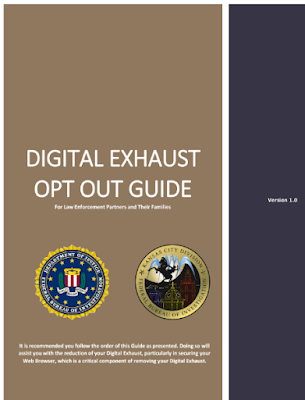Digital Exhaust Opt Out Guide
The Digital Exhaust Opt Out Guide was created to mitigate risk for Law Enforcement employees’ and their families as it pertains to protecting their personal information, which is vulnerable to exploitation. This risk includes potential for threat actors to identify, target, and track anyone affiliated with Law Enforcement via use of open source, Internet-based services offering searches of data aggregated about the American public. To mitigate this risk, this Guide was created as an aid for the Law Enforcement community in highlighting and presenting recommendations to reduce these vulnerabilities. You can download a copy of the guide here: https://www.documentcloud.org/documents/7048846-Digital-Exhaust-Opt-Out-Guide-for-LE-Partners.html
Michael Bazzell, a former government agent turned security consultant, has a data-removal guide available on his IntelTechniques web-site: https://inteltechniques.com/workbook.html The IntelTechniqies guide can help you remove your personal information from databroker sites like: Spokeo, Mylife, Radaris, Whitepages, Intelius, BeenVerified, Acxiom, Infotracer, Lexis Nexis, and TruePeopleSearch.
In 2006 the Chicago Bar Association published Protecting Your Personal Privacy - A Self-Help Guide for Judges and Their Families. A copy of that guide can be downloaded here: https://repository.law.uic.edu/whitepapers/1/
On March 31, 2021, the Director of National Intelligence (DNI) posted a document, the First Responder's Toolbox, saying: "Digital information, including personally identifiable information (PII), can be collected by illicit actors, providing them with potential targeting opportunities for doxing and presenting risks to first responders, including their identity, email and residential addresses, and other PII. First responder awareness on best practices of digital operational security (OPSEC) can increase their own personal safety, as well as that of their organizations.
https://www.dni.gov/files/NCTC/documents/jcat/firstresponderstoolbox/111s_-_First_Responders_Toolbox_-_Personal_Security_of_First_Responders_in_the_Digital_Age-survey.pdf
Removing your personal information from on-line sources is an important step in protecting your privacy and and enhancing your personal and family's security. The guides listed here contain information provided to law enforcement and government personnel to aid them in protecting themselves and their families. But you don't have to be a government agent to use these techniques; these techniques may even be used to protect yourself against heavy-handed government bureaucrats.
Regardless of one’s profession, personal beliefs, or political activities it makes sense to take security precautions on-line, just as one takes security precautions in the physical-world. But, when police and government agents feel the need to hide their identity from the communities they are supposed to ‘protect and serve’, perhaps it’s time for communities to use those same guides to protect themselves from corrupt police and government agents.

.png)


Comments
Post a Comment